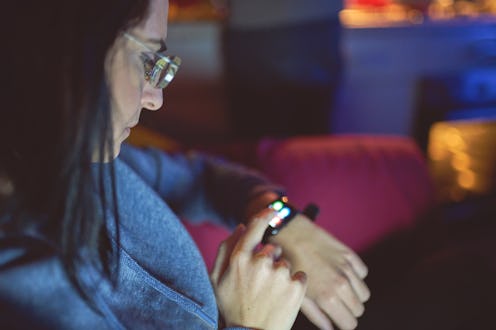Self
The Scientific Reason You've Been Ready For Bed At 5:30 p.m
This winter’s just hitting different.

Brittany, 31, would typically describe herself as a "pretty active and energized human," but ever since Daylight Savings Time ended in early November, she's been in a major slump. "Ever since the sun has been setting at 4:50 p.m., it’s been really hard to convince myself to socialize downstairs with my roommates or get out of bed in the morning," Brittany tells Bustle. "It doesn’t help that we’re in the second surge of a pandemic, so with it being darker longer and such, I really just want to sleep until spring." She adds that there's definitely a "mental health aspect" to the exhaustion she's feeling.
"Losing the sun earlier is more upsetting because I feel like by the time I am finally ready to get my day started, it's over," Nancy, 33, tells Bustle. "It feels like I'm trapped in a loop."
A quick scroll of the timeline suggests Brittany and Nancy aren't the only people feeling this way. "Wtf did they put in this daylight savings??? NyQuil????" Twitter user JaiVibez tweeted on Nov. 21 — a full 20 days after the clocks were turned back. Thousands of replies and quote Tweets echo the feeling of wanting to go to bed the second the sun sets. Despite having weeks to adjust to the hour time change, people are feeling totally out of it, even when they've gone through Daylight Savings Time ending many times before. What gives?
The first half of 2020 was, according to neuroscientist Sara Isbell, CEO and co-founder of Mercaptor Discoveries, "the biggest change to the world's social rhythm." Couple that with the second wave of the virus and daylight savings time ending has created an even greater sense of disorientation. Basically, without your pre-2020 rhythms, you experience time differently. "In the week between two of your Zoom meetings, your mental clock is counting fewer ticks than normal, making time seem like it’s flying by," Craig Callender Ph.D, a professor of philosophy at UC San Diego, previously told Bustle; in a typical year, we'd have many more meetings, lunches, dates, or other events to mark the passage of time, making it feel slower.
But what does that have to do with why this month has totally thrown off our daily cycles? Psychologist S. Mason Garrison tells Bustle that the brain hormone cortisol might also be responsible. "I wouldn't be surprised cortisol levels are entirely out of whack," Garrison says. "Cortisol is a stress hormone that also regulates some of the body's natural cycles, like sleep. And when we are in a constant state of stress those levels become elevated," she explains. Garrison adds that there's actually research that shows that time perception is linked with cortisol production. A 2015 study published in the Journal Biological Psychology suggested that changes in cortisol levels were associated with balanced and imbalanced perceptions of time, meaning, basically, that stress can make you understand time in different ways. Throw in the fact that this year has been unprecedentedly stressful, and it's no wonder you're ready for bed as soon as you close Zoom for the day.
Isbell suggests that people who experience Seasonal Affective Disorder may be particularly vulnerable to this sensation, especially because physical touch is harder to come by during the pandemic. "Touching someone releases serotonin," she says. Lacking serotonin — a "feel good" hormone — and otherwise feeling down "coupled with the change it causes to our perception and sense of time — leaves many feeling lost," Isbell says.
If this winter is totally throwing your rhythms off, making minor adjustments to your schedule, like starting your day earlier, can help you add some extra hours of sunlight. Nancy tells Bustle that though she's "not a morning person," forcing herself to wake up with the sun to make up for what's lost in the afternoon "definitely helps." Seeking a therapist's support can also help relieve some of the stress that may be throwing your rhythms off. But know, too, that the days start getting lighter again in just a few weeks, and Daylight Savings Time comes back March 14, 2021.
If you or someone you know is seeking help for mental health concerns, visit the National Alliance on Mental Illness (NAMI) website, or call 1-800-950-NAMI (6264). For confidential treatment referrals, visit the Substance Abuse and Mental Health Services Administration (SAMHSA) website, or call the National Helpline at 1-800-662-HELP(4357). In an emergency, contact the National Suicide Prevention Lifeline at 1-800-273-TALK(8255) or call 911.
Experts:
Neuroscientist Sara Isbell, CEO and co-founder of Mercaptor Discoveries
Psychologist S. Mason Garrison
Craig Callender Ph.D, a professor of philosophy at UC San Diego
Study Cited:
Olivera-Figueroa, L. A., Juster, R. P., Morin-Major, J. K., Marin, M. F., & Lupien, S. J. (2015). A time to be stressed? Time perspectives and cortisol dynamics among healthy adults. Biological psychology, 111, 90–99. https://doi.org/10.1016/j.biopsycho.2015.09.002